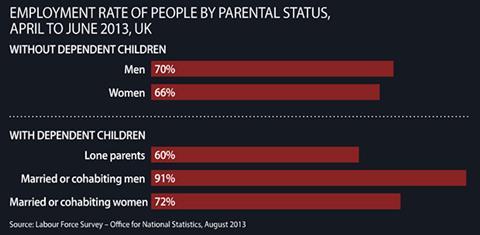
If you read nothing else, read this…
- 78% of people with dependent children were in employment, so employers need to consider workplace support where required.
- Cost and implementation time are often cited by employers as reasons why they do no offer their staff childcare support.
- It is easy for employers to assess the value of the childcare support that they offer.
The Working and workless households 2013 - Statistical bulletin published by the Office for National Statistics in August 2013 revealed that 78% of people with dependent children were in employment. This means that a significant proportion of employers’ workforces are likely to require support such as emergency childcare services at some point in time.
But emergency childcare did not feature in the core benefits packages of respondents surveyed for the Benefits research 2014 published in May 2014, and just 1% of employers offered it as part of their flexible benefits scheme.
Ben Black, director and founder of childcare services provider My Family Care, believes that parents’ differing requirements often deter employers from offering childcare benefits such as emergency childcare to their staff. He says: “While all parents agree that it would be great if their employer gave them more support, they all want different things. Some only want a nanny to come into their home, while others might want to use the nursery at the end of their road and another might only use childminders.”
Some employers may also be deterred from providing childcare benefits because they fear that implementation will prove time consuming and costly and not provide a return on investment, or at least not one that they can easily quantify.
But Iain McMath, managing director of Sodexo Benefits and Reward Services, says that a tailored approach to childcare support that is aligned to staff needs could help employers to maximise their value for money. “The majority of organisations offer a one-size-fits-all package, rather than what really works for their employees,” he says. “Part of that reasoning from HR is that it is simpler to do it that way rather than trying to create a dialogue with staff to find out about their position.”
Employers must identify staff needs before selecting benefits
Employers can start to assess the appropriateness of childcare support for their organisation once they have identified their employees’ specific needs.
Childcare vouchers are one of the most popular forms of childcare benefits and allow working parents to save up to £900 a year through a salary sacrifice funding arrangement with their employer. This enables both employees and employers to make tax and national insurance savings.
Many providers also offer value-added services that help employers to justify their spend.
Jo Dalby, finance director at benefits provider Busy Bees, says: “Any [employer] that takes our childcare vouchers has free access to our nationwide network of nurseries. They can contact us and we will organise a space for their employee’s child using the vouchers.”
There is a cost attached to the nursery place, but the provider’s place finding service is free.
Nursery places are declining in popularity

But the increasing cost of nursery places means that they are declining in popularity among employees. Sodexo’s McMath says: “Recently nurseries have been increasing their prices because they have not been covering their costs. Two and three-year-olds get free entitlement that the government pays for, but at a reduced rate. Nurseries charge more for the ordinary spaces to compensate for the reduction in income from the government.”
Onsite nurseries are an alternative form of tax-efficient childcare support for employers to consider offering their staff. But employers need to consider if staff demand justifies the total spend required for such an initiative. Busy Bees’s Dalby says: “If an employer has 50 staff but everyone has children then it would obviously be worth it. Vouchers are probably easiest for employers, but workplace nurseries take support to another level.”
My Family Care’s Black says: “Nine times out of 10 when we get asked about onsite childcare we tell employers that there are better ways to provide care with more flexibility and better value for money. It’s very rare onsite nurseries get built.”
Black adds that it is easy for employers to assess the value of the childcare support that they offer their staff. “They can ask employees if they worked when they wouldn’t have otherwise [if support was not in place],” he says. “If the answer is yes and they did not have to take time off, working out the return on investment is quite easy. It most probably costs £50 a day for childcare, so employers can easily work out if it is worth it.”

Northern Trust implements emergency childcare support for staff
Northern Trust has offered staff the opportunity to work flexibly for some time, but a review of its engagement policy resulted in the employer identifying a lack of emergency childcare in its benefits package.
Cara Collins, senior employee relations consultant at Northern Trust, says: “We looked at paying for a place at the nursery downstairs [in the organisation’s office building], but we did not think that was a good option because only one employee can benefit at any one time, and they also then have to bring their children into Canary Wharf. So we looked at other types of providers and decided that staff having access to a nursery near [their home] or having someone come to [their] house was better.”
The employer funds six sessions per employee per year through My Family Care. This can include emergency childcare, school holiday cover and elder and adult care.
Collins says: “We want to do what we can to help families, but families are made up in all sorts of different ways.”
She adds that the six sessions per employee offer incredibly good value to the organisation, with the management fee and actual usage cost working out to approximately £20 per head.
The service helped Northern Trust to win the Best Work-Life Balance Strategy award at the Employee Benefits Awards 2014 and to build a workforce that is 51% female, five times higher than the finance industry average.
“It is always good to feel like we are being recognised and what we are doing is the way forward, but we have to look at the next generation coming through,” she says. ”They are not looking at sitting at a desk nine to five, so our approach now is for hot-desking and for staff to spend a certain number of days in the office and a certain number of days at home.”































